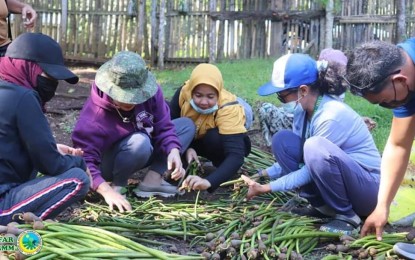
SEEDS OF SUSTAINABILITY. Residents in Southern Philippines prepare to plant about 6,000 pieces of mangrove propagules on April 28, under the auspices of the Ministry of Agriculture, Fisheries and Agrarian Reform of the Bangsamoro Autonomous Region in Muslim Mindanao. The activity was held along the shoreline of Barangay Buhanginan in Patikul Sulu. (Bangsamoro Information Office/Photos from MAFAR)
COTABATO CITY – A keen observer of Southern Philippines development trends has recognized the capacities of Muslim Mindanao to ultimately overcome its backwater history to pursue long-lasting stability and full progress.
Georgi Engelbrecht, senior analyst for Philippine affairs under the International Crisis Group (ICG), wrote in a recent paper that “the Bangsamoro has untapped economic potential that lies in stark contrast to the present reality of poverty.”
The ICG is a Brussels-based think-tank and advocacy group with offices in seven countries.
In his report released by the ICG, Engelbrecht admitted that “investments in the Bangsamoro, both national and international, will inevitably require time, and will be contingent on the quality of the BARMM’s governance and security environment.”
However, he conceded that “innovative approaches such as facilitating more sub-regional trade through increased port connectivity in the tri-boundary area, and allowing a barter trade mechanism to operate freely could be beneficial for BARMM, the Philippines, and Malaysia’s Sabah region.”
BARMM stands for Bangsamoro Autonomous Region in Muslim Mindanao, an entity created in 2019 following the passage of the Bangsamoro Organic Law.
Its transition timeline is presently being widely and aggressively petitioned by many sectors to be extended from 2022 to 2025.
“Manila could also support the BARMM by working with its neighbors to develop joint projects on fisheries, environmental preservation, and Islamic microfinance to further stimulate the local economy and bolster food security, particularly in the maritime communities of Basilan, Sulu, and Tawi-Tawi,” Engelbrecht added.
Muslim Mindanao is responsible for producing the country’s largest share of cassava and seaweeds.
“Domestic and foreign market demand for seaweeds, especially its derivative, carrageenan, has been strong, as these are used for a wide variety of commercial and industrial products such as dairy products, cosmetics, and food technology,” a report by the National Economic Development Authority reveals.
The area is also the country’s fourth-largest producer of corn, and the sixth of coconut. (PR)
